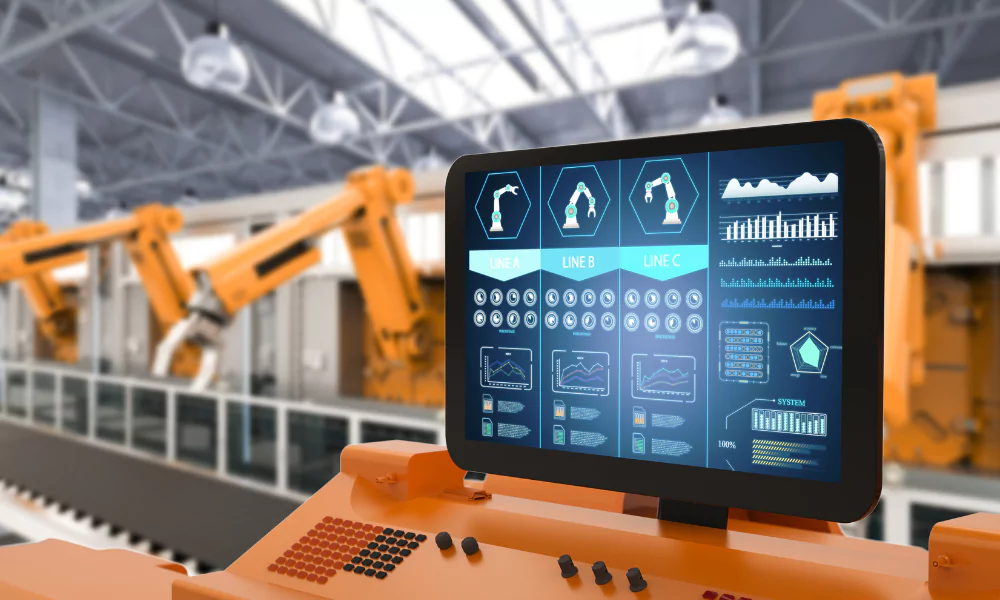
Retail automation isn’t just about speeding up tasks. It’s like having a super helpful assistant for your store!
It gives you all sorts of tools to make your brand awesome for customers, keep track of money and stuff, and make sure customers leave with big smiles.
Old-fashioned retail takes a lot of time and people, which can limit your store’s success. But automation gives you all the good things you need to run a modern store.
Because of this, more and more stores are using automation. One report says that by 2026, the global retail automation market could be worth $23.58 billion!
So, what is retail automation and how can it help your store? Let’s find out.
The Role of Automation in Retail Industry
Think of it as a helpful sidekick tackling repetitive tasks, freeing your time for more exciting work. In retail, it’s becoming a big deal in areas like marketing, finance, handling orders, keeping track of inventory, and more.
Automated things in this industry are leading the charge in the digital makeover of businesses. It works by connecting all the bits and pieces of data and systems, whether they’re floating around in the cloud or chilling on local servers. When everything’s connected smoothly, you can automate those everyday tasks.
When a customer clicks “checkout” online, and bam! Thanks to automation, a whole sequence of steps kicks off automatically. It’s like magic, but with technology.
Benefits of Automation in the Retail Industry
Automated systems streamline the entire customer experience, from in-store POS to online orders, delivery, returns, and support.
The main advantages of automation in retail include:
1. Enhancing the Customer Experience
Your audience expects a seamless, connected shopping journey across different channels. Automated systems achieve this by linking backend systems with user interfaces. They manage customer data and optimize processes like order management, CRM, and ERP systems with websites, apps, and POS systems, leading to higher customer satisfaction.
2. Reducing Labor Costs
Automated software reduces expenses by handling tasks like order fulfillment and streamlining workflows, including customer care via chatbots and virtual agents. These tools not only speed up processes but also assist human agents to enhance customer interactions.
3. Improving Efficiency
Streamlined workflows and processes minimize resource wastage, decrease manual tasks, and boost efficiency across retail operations.
4. Increasing Scalability
AI and ML technologies enable retailers to handle complex tasks faster and on a larger scale, from fraud protection to fulfilling higher volumes of orders, allowing them to serve more customers, especially during peak periods.
5. Enhancing Risk Management
Automation reduces human errors and enhances risk mitigation, particularly in areas like order fulfilment, where mistakes can be costly. While not flawless, AI, ML, and robots significantly decrease errors and improve overall risk management.
6. Boosting Agility and Resilience
Effective strategies make retailers more agile and resilient in managing disruptions and adapting to changes, including in supply chain management and during periods of growth.
Types of Automation in Retail Industry
Various forms, including workflow/process, analytics, order fulfilment automation, inventory management, and robotic, are crucial focuses for retailers aiming to excel and provide outstanding customer experiences.
1. Workflow or Process
It begins with data integration, facilitating application and system integration. By leveraging an integration platform as a service for automating integration, retailers can seamlessly connect software and platforms to establish tailored workflows that enhance both business operations and customer satisfaction.
2. Analytics
Automating analytics is crucial because retail technology generates a lot of data about customer preferences, behaviours, and business operations. This data is often scattered across various systems. By automating analytics, we can efficiently gather, organize, and interpret this data, allowing us to make informed decisions to improve our business.
3. Order Fulfillment
Order fulfilment automation ensures a seamless customer experience from payment to delivery, including returns. Modern order management systems streamline this process by centralizing information and connecting with shipping partners for efficient operations.
4. Inventory Management
Inventory management automation has gotten more complicated because stores now also act like mini-warehouses. With options like buying online and picking up in-store or having stuff shipped to the store, retailers need to keep track of what they have in real time to make sure they can meet customers’ needs.
5. Robotics
Robotic automation is transforming warehouse operations by rapidly and accurately picking and packing orders without breaks. This efficiency boost extends to urban areas, where self-driving vehicles expedite package deliveries to homes, further speeding up the process.
Automation, regardless of company size, enhances omnichannel operations. Digitizing processes and deploying automated retail technologies boost productivity, efficiency, and customer satisfaction while cutting costs and improving revenue and loyalty.
Solutions for Automation in the Retail Industry
While having the right tools and tech is crucial for automation, it’s about more than just gadgets and gizmos. The heart of it all is your workforce and how things get done.
Here are some strategies and solutions for retail automation that focus on building a strong team and organized workflow:
1. Evolving Work Methods
Automation changes how businesses operate, so every level of the company needs to adapt. For instance, smart robots can handle routine tasks in stores, freeing up managers to focus on more human-centric roles like helping customers.
2. Utilizing Human Resources
By automating routine tasks, you can unleash the potential of your skilled employees. Best Buy, for instance, created new customer service roles, improving customer support and boosting revenue.
3. Skill Enhancement
Automation demands new skills from employees. Reskilling your workforce is key to staying ahead. Walmart, for example, partnered with educational institutions to help employees gain the necessary skills for future roles.
4. Smart Hiring
With a growing need for tech-savvy workers, retailers should broaden their talent search. Peapod’s move to downtown Chicago shows how location can attract skilled talent. Also, hiring gig workers and outsourcing can fill skill gaps efficiently.
5. Fair Compensation
As automation creates more specialized jobs, investing in competitive wages and benefits is crucial for retaining top talent. Simply offering higher wages when necessary isn’t a sustainable strategy; consistent investment in wages is key.
FAQs: Importance of Automation in Retail Industry: Complete Guide
How does automation look in retail stores?
Automation in retail stores can be exemplified by self-checkout systems, inventory management software, and automated replenishment systems.
What is the future of automation in retail Industry?
Automation in retail Industry will be improved by robotic developments, AI-based personalization and a smooth omnichannel integration all aimed at creating ideal customer experiences and achieving operational efficiency and excellence.
Will automation in retail lead to job cuts for humans?
Automation in the retail industry may lead to job cuts in some areas, however, it also creates new positions in technology, customer service and data analytics.
What are some obstacles to automation in the retail industry?
The retail sector faces challenges such as upfront automation costs, worker training, possible resistance to change, and information safety and security.
Conclusion
To end, automation within the retail sector impacts operational processes dramatically, allowing for more efficiency, satisfaction, and cost reduction. With a plethora of solutions, such as inventory management to robotics, retailers can adjust to the dynamic environment.
The issues of staff training and resisting change are balanced by the gains of standardized procedures and quicker responsiveness. With the industry leaning more towards automation, Qodenext is one of the companies that offer tailored solutions to optimize workflows and empower their teams.


